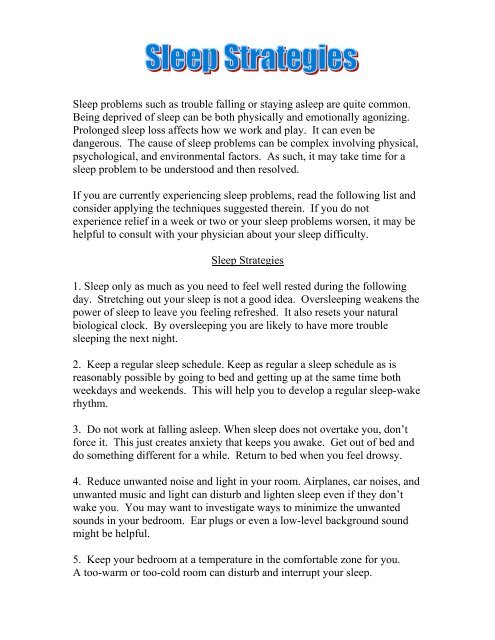Sleep Strategies
Sleep Strategies Sleep Strategies
Sleep problems such as trouble falling or staying asleep are quite common. Being deprived of sleep can be both physically and emotionally agonizing. Prolonged sleep loss affects how we work and play. It can even be dangerous. The cause of sleep problems can be complex involving physical, psychological, and environmental factors. As such, it may take time for a sleep problem to be understood and then resolved. If you are currently experiencing sleep problems, read the following list and consider applying the techniques suggested therein. If you do not experience relief in a week or two or your sleep problems worsen, it may be helpful to consult with your physician about your sleep difficulty. Sleep Strategies 1. Sleep only as much as you need to feel well rested during the following day. Stretching out your sleep is not a good idea. Oversleeping weakens the power of sleep to leave you feeling refreshed. It also resets your natural biological clock. By oversleeping you are likely to have more trouble sleeping the next night. 2. Keep a regular sleep schedule. Keep as regular a sleep schedule as is reasonably possible by going to bed and getting up at the same time both weekdays and weekends. This will help you to develop a regular sleep-wake rhythm. 3. Do not work at falling asleep. When sleep does not overtake you, don’t force it. This just creates anxiety that keeps you awake. Get out of bed and do something different for a while. Return to bed when you feel drowsy. 4. Reduce unwanted noise and light in your room. Airplanes, car noises, and unwanted music and light can disturb and lighten sleep even if they don’t wake you. You may want to investigate ways to minimize the unwanted sounds in your bedroom. Ear plugs or even a low-level background sound might be helpful. 5. Keep your bedroom at a temperature in the comfortable zone for you. A too-warm or too-cold room can disturb and interrupt your sleep.
<strong>Sleep</strong> problems such as trouble falling or staying asleep are quite common.<br />
Being deprived of sleep can be both physically and emotionally agonizing.<br />
Prolonged sleep loss affects how we work and play. It can even be<br />
dangerous. The cause of sleep problems can be complex involving physical,<br />
psychological, and environmental factors. As such, it may take time for a<br />
sleep problem to be understood and then resolved.<br />
If you are currently experiencing sleep problems, read the following list and<br />
consider applying the techniques suggested therein. If you do not<br />
experience relief in a week or two or your sleep problems worsen, it may be<br />
helpful to consult with your physician about your sleep difficulty.<br />
<strong>Sleep</strong> <strong>Strategies</strong><br />
1. <strong>Sleep</strong> only as much as you need to feel well rested during the following<br />
day. Stretching out your sleep is not a good idea. Oversleeping weakens the<br />
power of sleep to leave you feeling refreshed. It also resets your natural<br />
biological clock. By oversleeping you are likely to have more trouble<br />
sleeping the next night.<br />
2. Keep a regular sleep schedule. Keep as regular a sleep schedule as is<br />
reasonably possible by going to bed and getting up at the same time both<br />
weekdays and weekends. This will help you to develop a regular sleep-wake<br />
rhythm.<br />
3. Do not work at falling asleep. When sleep does not overtake you, don’t<br />
force it. This just creates anxiety that keeps you awake. Get out of bed and<br />
do something different for a while. Return to bed when you feel drowsy.<br />
4. Reduce unwanted noise and light in your room. Airplanes, car noises, and<br />
unwanted music and light can disturb and lighten sleep even if they don’t<br />
wake you. You may want to investigate ways to minimize the unwanted<br />
sounds in your bedroom. Ear plugs or even a low-level background sound<br />
might be helpful.<br />
5. Keep your bedroom at a temperature in the comfortable zone for you.<br />
A too-warm or too-cold room can disturb and interrupt your sleep.
6. Do not go to bed hungry. A light snack before bedtime may help you fall<br />
asleep, as well as prevent hunger pangs that can wake you during the night.<br />
But don’t overeat before you go to bed, either. Indigestion can wake you up<br />
too.<br />
7. An occasional sleep pill, when prescribed, may be helpful. Habitual<br />
usage should be avoided.<br />
8. In the evening, do not drink beverages that contain caffeine. Even if you<br />
don’t feel it, caffeine, whether from coffee, tea, colas or chocolate, disturbs<br />
sleep.<br />
9. Do not have a nightcap. Although alcohol at bedtime can help a tense<br />
person fall asleep, the sleep is less sound. Nightcaps can actually cause you<br />
to awaken in the middle of the night. Also, alcohol at night can make you<br />
feel groggy the next morning. This includes many of the over-the-counter<br />
cold preparations that contain alcohol.<br />
10. Try not to smoke in the evening. Though tobacco does calm the<br />
nicotine-dependent person, it also acts as a stimulant that can disturb sleep.<br />
11. Exercise daily. Occasional exercise may not improve sleeping. Regular<br />
exercise, however, has been shown to deepen sleep. Avoid strenuous<br />
exercise within two hours of bedtime.<br />
12. Try to lead an active lifestyle. Your level of daytime activity influences<br />
your sleep cycle. Being active during the day and doing things that you find<br />
enjoyable can help you to sleep better.<br />
Prepared by Dr. Tricia Park, Asst. Dean/Director of Student Counseling 464-3120, ext 5.



